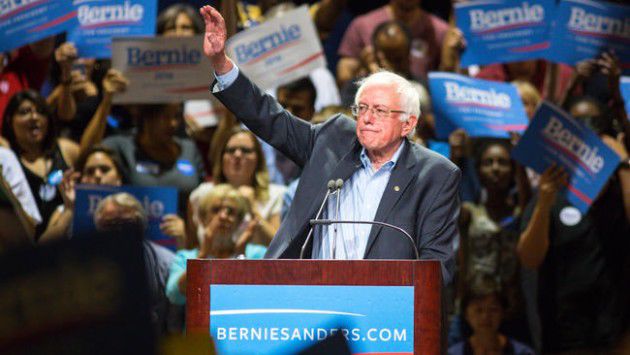Viewing Bernie Sanders as politician first, celebrity second
April 11, 2016
Last Wednesday, Temple University hosted a rally for Bernie Sanders. As one of his more skeptical supporters, I wanted to go, especially for the opportunity to hear a presidential candidate speak in my favorite city. Admittedly, I face the plight of many college students with comparatively more conservative parents. When I told my father I was going, I expected (perhaps unfairly) to be chastised, but his response was simply cautioning: “I’m glad you’re paying attention to the election. I hope you really listen to what he has to say, and you think about it.” Well, Dad, you’ll be glad to know that I did.
My friends and I arrived at the Liacouras Center to find that, three hours before doors even opened, the line nearly encircled the arena. Among us, petitioners and local politicians capitalized on the presence of the young, eager, liberal audience. Vendors offered tacky pins, and T-shirts read embarrassing slogans like “Bern Down for What,” “Hillary Listens to Nickelback” and “Talk Bernie to Me.” Parents, toting signs, brought along their too-young children donning similar political apparel. A little out of sorts, but not entirely surprised, I finally entered the arena, where audience members were dancing, mingling and doing the wave. It was a generous atmosphere, if an odd one.
This sentiment was reaffirmed when Sanders, the fourth speaker, took the stage, having been introduced by his campaign manager, a local politician and a union leader. Their brief messages served to elicit the same raucous applause that met Sanders when he reached the podium and launched into his speech.
Shouldn’t it be encouraging that an entire arena erupted in unanimous cheers when a presidential candidate declared “Black Lives Matter?” Or when he asserted that, yes, women alone should be responsible for their bodies? Of course. Sanders is supporting issues that are deserving and indicative of the problems most actively and arduously faced by our generation.
For Sanders, though, to make such claims towards an arena of like-minded people, and with the privilege of removal, is easy. He will not face the same volume of violent, hateful criticism and threats that leaders in the Black Lives Matter movement or employees of Planned Parenthood will in defending these causes. While his plans for these issues have not had the opportunity to be actualized in office, it still feels a bit cheap to be using them as rally cries. There’s somewhat of a false pretense at work implying that we have to wait for legislation to get involved, when really there are (lots of, but not enough) brave people out there making change happen already who aren’t getting enough credit.
Unfortunately, Sanders punctuated his predictable address with a bothersome response to Clinton’s claim that Sanders is unfit to assume the presidency, insisting that it is in fact Clinton who is “unqualified,” a comment that was met with passionate applause but that left me disenchanted. He could have easily responded in the affirmative, that his experience in Vermont, long history advocating social justice and consistency in his track record do legitimize his experience. Or, as her comment really warranted no response, he could have left it alone.
Rather than doing so, though, he pointed fingers back at Clinton. This doesn’t make him unusual as a politician, but rather inconsistent in the standards of running a clean campaign that he’d once openly held for himself, especially in making such a flimsy claim. I liked to think that I was among people who supported Sanders for the perceived authenticity of his goals, for a vision of democracy that is inclusive and fair, and for focus not on material wealth and power but instead on unity. And maybe I was, but it really didn’t seem that way. Vehement booing at the sheer mention of “billionaires,” immature merchandise and the misplaced emphasis on the legalization of marijuana were indicative instead of the credibility of some of the most persistent criticism that Sanders’ supporters face. These collective actions serve to undermine an endeavor for reform that should be based on forgiveness and authenticity by eluding the occupation of the purported moral superiority that is worn like colorful pins on T-shirts.
This sort of hero-worship presents a slippery slope towards ignorance, one that Donald Trump’s supporters have already tumbled down. I do not attempt to liken the two candidates or their supporters but instead to warn the consequences of tactics that have enshrined the candidates on a pedestal. It renders them immune to change brought about by meaningful criticism among voters, otherwise dangerously aligning the varied interests and needs of their supporters behind one person who happens to be seeking the most powerful position in the world.
Sanders has perhaps only stumbled in comparison, but is beginning to demonstrate the same ideological vulnerability that is concurrent with gaining power. His platform in the election cycle has relied too heavily on representing the underdog to reconcile this inevitable assumption of the influence he still openly denounces. In response, he has done little to counteract the commoditized celebrity that such chance as a bird landing on his podium incited and he seems uncomfortable commanding an audience that will do anything other than praise him. Perhaps he and his campaign do not actively pander to the curiosity of the technology generation, but I’ve come to believe this is because they were never without it.
A political rally, I’ve learned, is not the place to go to confront issues or ask questions. It is, however, an opportunity to make observations about a candidate and a campaign in action. In follow-up, my father asked, somewhat sarcastically, if I now “felt the Bern.” I suppose it’s not a burn I feel, but a support that is unwilling to suspend caution, one that views Sanders first and foremost as a politician who deserves to be approached in the same way as anyone who holds that title, regardless of how much we admire him.



